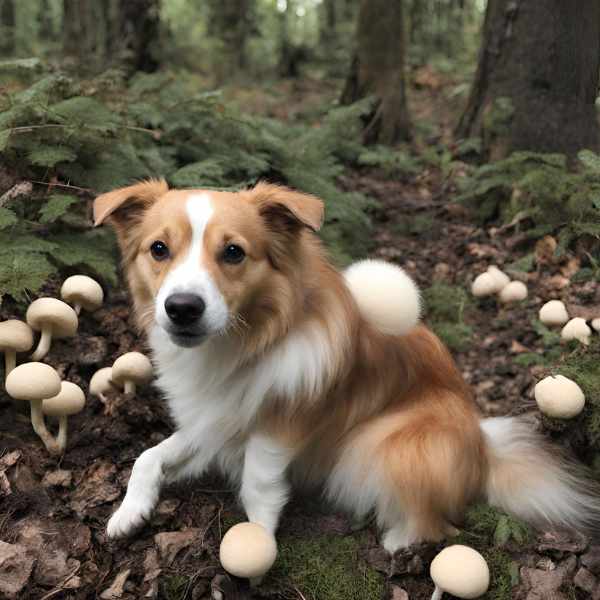Yes, Dog owners should know that puffball mushrooms are safe for dogs to eat. However, when these mushrooms grow up, they become unsafe and could harm our pets. The harmful substances in mature puffballs might make dogs feel tired and sick.
It’s important to monitor our dogs carefully, especially if they’ve been around puffball mushrooms outdoors. If a dog eats these mushrooms, it’s better to get help from a vet to make sure the dog is okay.
Being good pet owners means keeping our dogs away from mature puffballs and being careful when they play outside where these mushrooms might be. This way, we can make sure our dogs stay safe and healthy.
Health Benefits of Puffball Mushrooms for Dogs

Rich in Protein: Puffball mushrooms are a good source of protein, which is essential for muscle health and overall growth in dogs.
Boosts Immune System: These mushrooms contain nutrients that can help boost the immune system of dogs, aiding in their ability to fight off infections and diseases.
Potential Anti-Inflammatory Effects: Some mushrooms, including puffball mushrooms, may possess anti-inflammatory properties, which can benefit dogs with inflammatory conditions.
Supports Skin Health: Puffball mushrooms are traditionally used for skin disorders, suggesting potential benefits for maintaining healthy skin and coat in dogs.
Nutrient-Rich: While specific nutritional content may vary, puffball mushrooms are generally considered to be nutrient-rich, providing various vitamins and minerals that contribute to overall canine health.
Health Risks of Puffball Mushrooms for Dogs

Respiratory Issues: Inhaling spores from puffball mushrooms can lead to respiratory problems in dogs, causing symptoms like dyspnea, lethargy, fever, and inappetence.
Lung Inflammation: Reports suggest that inhaling pores of puffball mushrooms in large quantities may cause lung inflammation in dogs.
Digestive Upset: While not necessarily toxic, ingestion of puffball mushrooms can result in gastrointestinal upset, leading to symptoms such as vomiting and diarrhea.
Potential Allergic Reactions: Some dogs may experience allergic reactions to puffball mushrooms, manifesting as skin irritation or other allergic symptoms.
Rare Respiratory Diseases: Inhaling spores from puffball mushrooms can lead to rare respiratory diseases like lycoperdonosis, which is characterized by respiratory distress in dogs.
How to Serve Puffball Mushrooms to Dogs?
Limit Quantity: Offer puffball mushrooms to dogs in small portions as part of a balanced diet. Moderation is key to preventing any adverse effects.
Cook Thoroughly: Cooking puffball mushrooms thoroughly can help break down any indigestible components and make them easier for dogs to digest. Avoid serving raw mushrooms to dogs.
Monitor for Reactions: After introducing puffball mushrooms to your dog’s diet, monitor them closely for any signs of digestive upset or allergic reactions. If any adverse reactions occur, discontinue feeding them immediately.
